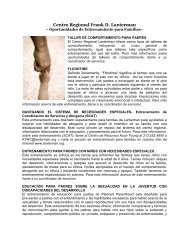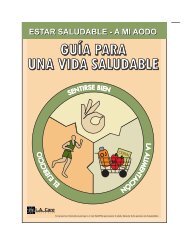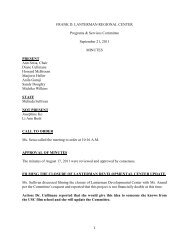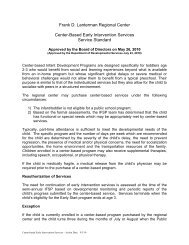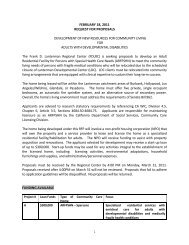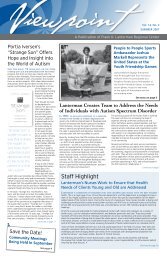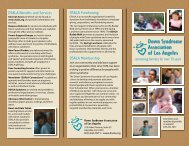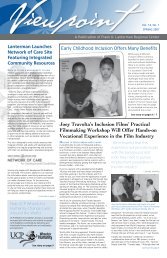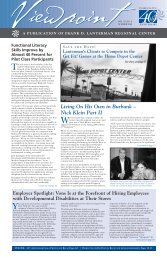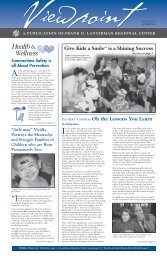Guide to Lanterman for Early Start Families - Frank D. Lanterman ...
Guide to Lanterman for Early Start Families - Frank D. Lanterman ...
Guide to Lanterman for Early Start Families - Frank D. Lanterman ...
You also want an ePaper? Increase the reach of your titles
YUMPU automatically turns print PDFs into web optimized ePapers that Google loves.
<strong>Guide</strong> <strong>to</strong> <strong>Lanterman</strong> Regional Center<br />
<strong>for</strong> <strong>Early</strong> <strong>Start</strong> <strong>Families</strong><br />
Getting a Good <strong>Start</strong>
<strong>Guide</strong> <strong>to</strong> <strong>Lanterman</strong> Regional Center <strong>for</strong> <strong>Early</strong> <strong>Start</strong> <strong>Families</strong> Table of Contents<br />
About <strong>Frank</strong> D. <strong>Lanterman</strong> Regional Center................ 2<br />
Our mission is................................................................................... 2<br />
Our vision is....................................................................................... 2<br />
Our goal <strong>for</strong> early intervention is............................................. 2<br />
About the <strong>Guide</strong> <strong>to</strong> <strong>Lanterman</strong> Regional Center<br />
<strong>for</strong> <strong>Early</strong> <strong>Start</strong> <strong>Families</strong>................................................................... 2<br />
<strong>Lanterman</strong>’s Service Commitment .......................................... 3<br />
About <strong>Early</strong> <strong>Start</strong> Services ......................................................... 4<br />
v Examples of <strong>Early</strong> <strong>Start</strong> Services ................................... 4<br />
A Brief His<strong>to</strong>ry of <strong>Early</strong> Intervention ................................... 5<br />
v Excerpt from the Cali<strong>for</strong>nia<br />
<strong>Early</strong> Intervention Services Act (CEISA).................... 5<br />
The Role of the Regional Center ............................................. 6<br />
Regional Center Responsibility <strong>for</strong><br />
Purchasing Services ........................................................................ 6<br />
Funding Requirements <strong>for</strong> <strong>Early</strong> <strong>Start</strong> Services ................ 7<br />
v Natural Environments: What are they?....................... 7<br />
v Natural Supports: What are they? ................................. 7<br />
v Defining Generic Services ............................................... 7<br />
Working Together in Partnership ......................................... 8<br />
Partnering with Your Service Coordina<strong>to</strong>r .......................... 8<br />
v FAQ*: Can a child lose his or her<br />
eligibility <strong>for</strong> services?.......................................................8<br />
v FAQ: What happens if the child receiving<br />
services moves out of <strong>Lanterman</strong>’s area?................... 8<br />
Contacting Your Service Coordina<strong>to</strong>r..................................... 9<br />
v Finding Help in an Urgent Situation........................ 9<br />
v FAQ: What should I do if I do not know the<br />
name of my child’s service coordina<strong>to</strong>r?................... 9<br />
Service Coordina<strong>to</strong>rs’ Responsibilities<br />
in the Partnership.......................................................................... 10<br />
v KochlYoung Resource Center ................................. 10<br />
<strong>Families</strong>’ Responsibilities in the Partnership....................... 11<br />
v Be Prepared and Actively Participate......................... 11<br />
v FAQ: What should I include in my<br />
<strong>Lanterman</strong> Regional Center home file?.................... 11<br />
v Find Support Within the <strong>Lanterman</strong><br />
Community....................................................................... 12<br />
v Tips <strong>for</strong> Forming a Successful<br />
Family-Professional Partnership................................ 12<br />
Family Centered Planning.......................................................... 13<br />
The Individualized Family Service Plan (IFSP)................ 13<br />
Preparing <strong>for</strong> the IFSP Meeting.............................................. 13<br />
v FAQ: Why is it important <strong>for</strong> my service<br />
coordina<strong>to</strong>r <strong>to</strong> visit me in my home?...................... 13<br />
What Happens at an IFSP Meeting...................................... 14<br />
v FAQ: Why are my child’s services and<br />
supports different from those received<br />
by other children?............................................................. 14<br />
Implementing the IFSP .............................................................. 14<br />
v Examples of IFSP Outcomes and Criteria................ 15<br />
Moni<strong>to</strong>ring Your Child’s Progress.......................................... 15<br />
v FAQ: What is required <strong>to</strong> maintain<br />
active status?........................................................................ 15<br />
Transitioning from <strong>Early</strong> <strong>Start</strong> at Age 3.......................... 16<br />
Transition Planning Meeting with the School District..... 16<br />
Continuing Regional Center Eligibility.............................. 16<br />
Eligibility <strong>for</strong> School Services................................................... 17<br />
Individualized Education Program (IEP) Meeting......... 17<br />
Resolving Disagreements About<br />
<strong>Early</strong> <strong>Start</strong> Services and Supports........................................18<br />
<strong>Early</strong> <strong>Start</strong> Mediation Conference Request.........................18<br />
<strong>Early</strong> <strong>Start</strong> Due Process Hearing..............................................18<br />
<strong>Early</strong> <strong>Start</strong> State Complaint Process.......................................18<br />
<strong>Families</strong>’ Rights and Responsibilities in<br />
<strong>Early</strong> <strong>Start</strong>............................................................................................... 19<br />
Receiving Quality and Effective<br />
Services and Supports................................................................. 20<br />
v FAQ: What can I do <strong>to</strong> ensure the<br />
quality of the services being provided<br />
<strong>to</strong> my child?...................................................................... 20<br />
*FAQ – Frequently Asked Question<br />
<strong>Guide</strong> <strong>to</strong> <strong>Lanterman</strong> Regional Center <strong>for</strong> <strong>Early</strong> <strong>Start</strong> <strong>Families</strong>
Our mission is...<br />
To enable people with<br />
developmental disabilities <strong>to</strong> live<br />
purposeful lives as active members<br />
of their communities.<br />
Our vision is...<br />
A world where every person is<br />
respected and embraced.<br />
Our goal <strong>for</strong> early<br />
intervention is…<br />
To prevent or lessen developmental<br />
delay in infants and <strong>to</strong>ddlers<br />
through support, education and<br />
access <strong>to</strong> resources.<br />
About <strong>Frank</strong> D. <strong>Lanterman</strong> Regional Center<br />
<strong>Frank</strong> D. <strong>Lanterman</strong> Regional Center is one of 21 regional centers in the<br />
state of Cali<strong>for</strong>nia that <strong>to</strong>gether serve over 240,000 individuals with, or at<br />
risk <strong>for</strong>, developmental delays or disabilities and their families. Established<br />
in 1966 as one of the first two regional centers, <strong>Lanterman</strong> is a private nonprofit<br />
corporation that operates under contract with the state of Cali<strong>for</strong>nia<br />
through the Department of Developmental Services (DDS). It is governed by<br />
a community-based board of direc<strong>to</strong>rs that is comprised of individuals with<br />
developmental disabilities, family members and community leaders.<br />
The Center serves approximately 8,000 children and adults, of whom more<br />
than 1,200 are under the age of 3. Our service area includes Hollywood-<br />
Wilshire, Central Los Angeles, Glendale, Burbank, La Cañada Flintridge,<br />
La Crescenta and Pasadena. Working in partnership with our families, service<br />
providers and community organizations, we provide services and supports<br />
that address each child’s unique strengths and needs with a goal of achieving<br />
greater self-reliance and independence.<br />
About the <strong>Guide</strong> <strong>to</strong> <strong>Lanterman</strong> Regional<br />
Center <strong>for</strong> <strong>Early</strong> <strong>Start</strong> <strong>Families</strong><br />
This <strong>Guide</strong> is written <strong>for</strong> parents of young children, ages birth <strong>to</strong> 3 years,<br />
who are receiving <strong>Early</strong> <strong>Start</strong> services through <strong>Lanterman</strong> Regional Center.<br />
Between now and your child’s 3 rd birthday, you will take a journey filled<br />
with choices and challenges, as well as successes. This <strong>Guide</strong> is intended <strong>to</strong><br />
help you create a more effective partnership with the Regional Center as you<br />
navigate this journey. The <strong>Guide</strong> covers seven important <strong>to</strong>pics:<br />
v <strong>Early</strong> <strong>Start</strong> services<br />
v Working in partnership with the Regional Center<br />
v Family centered planning and its implementation<br />
v Transitioning out of <strong>Early</strong> <strong>Start</strong> services at age 3<br />
v Resolving disagreements about services and supports<br />
v <strong>Families</strong>’ legal rights and responsibilities<br />
v Receiving effective and appropriate services and supports<br />
Throughout these pages, you will also find answers <strong>to</strong> frequently asked<br />
questions (FAQs) and tips from experienced parents and service coordina<strong>to</strong>rs<br />
that can make you a more effective partner.<br />
<br />
<strong>Frank</strong> D. <strong>Lanterman</strong> Regional Center
<strong>Lanterman</strong>’s Service Commitment<br />
In all of our interactions with families, we are committed <strong>to</strong>:<br />
• Treat you with courtesy and respect, and listen<br />
attentively <strong>to</strong> your concerns – with understanding<br />
and without judgment.<br />
• Be sensitive <strong>to</strong> and acknowledge cultural<br />
differences.<br />
• Encourage you <strong>to</strong> make your own in<strong>for</strong>med choices,<br />
and respect and support your decisions.<br />
• Respond <strong>to</strong> requests as quickly as possible and<br />
explain any delays.<br />
• Respond promptly and constructively <strong>to</strong> your<br />
concerns. If you feel we have not been responsive or<br />
have caused you <strong>to</strong> be dissatisfied with <strong>Lanterman</strong>,<br />
we will <strong>for</strong>ward your complaint <strong>to</strong> the appropriate<br />
authority <strong>to</strong> respond quickly and constructively <strong>to</strong><br />
your concerns.<br />
• Come <strong>to</strong> meetings and appointments promptly,<br />
prepared with the necessary in<strong>for</strong>mation.<br />
• Explain the regional center service delivery system,<br />
as well as what <strong>Lanterman</strong>’s role and relationships<br />
are with the many other agencies and service<br />
delivery systems, so that it makes sense and you feel<br />
able <strong>to</strong> access these different resources.<br />
• Share all the in<strong>for</strong>mation we have about<br />
the available service options, offering our<br />
recommendations in a constructive manner. We<br />
will be honest about what we are and are not able<br />
<strong>to</strong> do. If we cannot help you, we will try <strong>to</strong> find<br />
someone who can.<br />
• Respect your right <strong>to</strong> privacy and hold in confidence<br />
all in<strong>for</strong>mation obtained in the course of<br />
professional service.<br />
• Solicit your ideas and suggestions about how we<br />
can improve our services.<br />
• Stay current in our field, and maintain professional<br />
standards.<br />
<strong>Guide</strong> <strong>to</strong> <strong>Lanterman</strong> Regional Center <strong>for</strong> <strong>Early</strong> <strong>Start</strong> <strong>Families</strong>
Examples of <strong>Early</strong><br />
<strong>Start</strong> Services<br />
The services received through<br />
<strong>Early</strong> <strong>Start</strong> are based on the child’s<br />
assessed developmental needs and<br />
the family’s concerns and priorities<br />
as determined by each child’s<br />
Individualized Family Service Plan.<br />
<strong>Early</strong> <strong>Start</strong> services may include:<br />
• Assistive technology<br />
• Audiology<br />
• Family training, counseling and<br />
home visits<br />
• Health services<br />
• Medical services <strong>for</strong> diagnostic/<br />
evaluation purposes only<br />
• Nursing services<br />
About <strong>Early</strong> <strong>Start</strong> Services<br />
The Regional Center’s <strong>Early</strong> <strong>Start</strong> program serves children from birth <strong>to</strong> 3 who<br />
are born with, or at risk <strong>for</strong>, developmental delay or disability. We know that the<br />
earlier an infant or <strong>to</strong>ddler with special needs receives appropriate services, the<br />
more successful we can be in minimizing or preventing future disabilities. For<br />
this reason, our <strong>Early</strong> Intervention unit works with families <strong>to</strong> access services and<br />
supports that help identify and treat developmental concerns as early as possible in<br />
the life of the child. Services focus on the child’s development in five areas:<br />
v Cognitive – ability <strong>to</strong> think and learn<br />
v Physical – mo<strong>to</strong>r, including vision and/or hearing<br />
v Communication – ability <strong>to</strong> understand, talk<br />
v Social and emotional – ability <strong>to</strong> relate <strong>to</strong> others<br />
v Adaptive – ability <strong>to</strong> eat, dress and accomplish other self-help tasks<br />
Having a child with special needs often requires the family <strong>to</strong> devote extra time,<br />
energy or resources <strong>to</strong> the child’s care, and this can be challenging <strong>for</strong> both<br />
parents and siblings. At the same time, the primary responsibility <strong>for</strong> an infant’s<br />
or <strong>to</strong>ddler’s development and well-being rests with the family. For these reasons,<br />
services provided by the Regional Center are family centered, meaning they<br />
address the needs of the child within the context of the family with the intent of<br />
enhancing the family’s capacity <strong>to</strong> address their child’s special needs.<br />
• Nutrition services<br />
• Occupational therapy<br />
• Physical therapy<br />
• Psychological services<br />
• Respite services when necessary<br />
<strong>for</strong> the child’s parents <strong>to</strong> access<br />
<strong>Early</strong> <strong>Start</strong> trainings or workshops<br />
• Service coordination<br />
• Social work services<br />
• Special instruction<br />
• Speech and language services<br />
• Vision services<br />
<br />
<strong>Frank</strong> D. <strong>Lanterman</strong> Regional Center
A Brief His<strong>to</strong>ry of <strong>Early</strong> Intervention<br />
In 1986, the federal government enacted the <strong>Early</strong> Intervention Program <strong>for</strong><br />
Infants and Toddlers with Disabilities under the Individuals with Disabilities<br />
Education Act, Part C (IDEA; 20; U.S.C., Section 1431 et seq.). This legislation<br />
was intended <strong>to</strong> assist states in implementing a comprehensive program of early<br />
intervention services <strong>for</strong> infants and <strong>to</strong>ddlers with developmental delays or<br />
disabilities. The Act set out specific requirements that state early intervention<br />
programs were obligated <strong>to</strong> meet in return <strong>for</strong> federal dollars that would<br />
partially fund these programs. The objectives defined in the act were <strong>to</strong>:<br />
v Enhance the development of infants and <strong>to</strong>ddlers with disabilities;<br />
v Reduce educational costs by minimizing the need <strong>for</strong> special education<br />
through early intervention;<br />
v Minimize the likelihood of institutionalization and maximize independent<br />
living; and,<br />
v Enhance the capacity of families <strong>to</strong> meet their child’s needs.<br />
In 1993, in response <strong>to</strong> the federal legislation, the Cali<strong>for</strong>nia Legislature passed<br />
the Cali<strong>for</strong>nia <strong>Early</strong> Intervention Services Act (CEISA; 14 G.C. Section 95000<br />
et seq.). The Department of Developmental Services (DDS) was designated<br />
as the lead agency <strong>to</strong> collaborate with other state agencies, including the<br />
Department of Education, in the development and implementation of a<br />
statewide early intervention services system, referred <strong>to</strong> as Cali<strong>for</strong>nia <strong>Early</strong> <strong>Start</strong>.<br />
Excerpt from the<br />
Cali<strong>for</strong>nia <strong>Early</strong><br />
Intervention Services<br />
Act (CEISA)<br />
Section 95001 of the Cali<strong>for</strong>nia <strong>Early</strong><br />
Intervention Services Act states: “The<br />
family is the constant in the child’s life,<br />
while the service system and personnel<br />
within those systems fluctuate. Because<br />
the primary responsibility of an infant’s<br />
or <strong>to</strong>ddler’s well-being rests with the<br />
family, services should support and<br />
enhance the family’s capability <strong>to</strong> meet<br />
the special developmental needs of<br />
their infant or <strong>to</strong>ddler with disabilities.”<br />
The Cali<strong>for</strong>nia <strong>Early</strong> Intervention Services<br />
Act is available online at www.dds.ca.gov.<br />
Printed copies of the Act are available <strong>for</strong><br />
borrowing from <strong>Lanterman</strong>’s KochlYoung<br />
Resource Center.<br />
<strong>Guide</strong> <strong>to</strong> <strong>Lanterman</strong> Regional Center <strong>for</strong> <strong>Early</strong> <strong>Start</strong> <strong>Families</strong>
The Role of the Regional Center<br />
CEISA gave regional centers the primary responsibility <strong>for</strong><br />
implementing the early intervention program. Acting as the<br />
central coordinating agency <strong>for</strong> a large and complex network<br />
of community services and supports, regional centers are<br />
charged with the following responsibilities:<br />
v Outreach activities <strong>to</strong> identify young children who may<br />
need early intervention services.<br />
v Assessment and evaluation <strong>to</strong> determine eligibility <strong>for</strong> early<br />
intervention services.<br />
v Development of an Individualized Family Service Plan<br />
(IFSP), through a family centered planning process.<br />
v Coordination of services and supports <strong>to</strong> help young<br />
children and their families achieve the desired outcomes<br />
established <strong>for</strong> the child.<br />
v Assistance in finding and using community and<br />
other resources.<br />
v Support <strong>for</strong> and facilitation of the inclusion of young<br />
children with disabilities with their non-disabled peers.<br />
v Development of innovative and cost-effective services and<br />
supports that are flexible, individualized and promote<br />
community integration.<br />
v Assurance of the quality and effectiveness of services and<br />
supports provided <strong>to</strong> young children and their families.<br />
v In<strong>for</strong>mation, referral and family support.<br />
Regional Center Responsibility <strong>for</strong><br />
Purchasing Services<br />
Because of our responsibility <strong>to</strong> be careful stewards of public<br />
funds, the Regional Center works with families <strong>to</strong> investigate all<br />
available natural and generic options, including the use of private<br />
insurance, when these options can meet the child’s needs.<br />
If one or more of the desired outcomes in a child’s IFSP cannot<br />
be achieved using natural supports or generic services, the<br />
Regional Center may purchase the service or support from a<br />
community service provider. If the funding is approved, we send<br />
the provider a written authorization <strong>to</strong> provide the service. The<br />
Center only reimburses providers <strong>for</strong> services that are included<br />
in the IFSP and provided after an authorization is received.<br />
Continuation of funding <strong>for</strong> a service purchased by the<br />
Regional Center may only be authorized if there is evidence that<br />
the service is helping achieve or maintain the desired outcomes<br />
outlined in the IFSP. In all cases, be<strong>for</strong>e funding is initiated or<br />
continued, the family must indicate agreement by signing the<br />
IFSP or an IFSP amendment.<br />
All purchases made by the Regional Center must be consistent<br />
with our service standards, which are approved by our board of<br />
direc<strong>to</strong>rs and the Department of Developmental Services. In<br />
extraordinary circumstances, the Center may make a purchase<br />
that is an “exception” <strong>to</strong> a service standard. A request <strong>for</strong> an<br />
exception must be reviewed and approved by the Center’s<br />
executive direc<strong>to</strong>r or his or her designee.<br />
<strong>Lanterman</strong>’s service standards can be viewed on our Web site at<br />
www.lanterman.org.<br />
<br />
<strong>Frank</strong> D. <strong>Lanterman</strong> Regional Center
Funding Requirements <strong>for</strong> <strong>Early</strong> <strong>Start</strong> Services<br />
In carrying out their responsibilities, regional centers are also required <strong>to</strong> be<br />
responsible stewards of the public funds. More specifically, regional centers<br />
are required <strong>to</strong>:<br />
v Live within our budget each year.<br />
v Ensure that the Regional Center does not pay <strong>for</strong> services and supports<br />
that should be provided by other agencies, such as local school districts,<br />
Medi-Cal, Cali<strong>for</strong>nia Children’s Services, Social Security and private<br />
health insurance.<br />
v Help families gain access <strong>to</strong> typical community resources and develop<br />
natural supports.<br />
v Secure services only from qualified service providers.<br />
v Locate or develop innovative and cost-effective ways <strong>to</strong> achieve desired<br />
outcomes identified in the IFSP.<br />
v Continue purchasing services only where there is both reasonable<br />
progress in achieving the IFSP outcomes and agreement between the<br />
family and the Regional Center that the services should be continued.<br />
v Develop and purchase specialized services only if natural environments,<br />
generic services and supports, or typical community resources do not<br />
meet the child’s needs as specified in his or her IFSP.<br />
v If two services or supports are available and would be equally effective<br />
in meeting the needs of a child, the Regional Center is required <strong>to</strong><br />
purchase the less costly alternative.<br />
Defining Generic Services<br />
There are many public agencies that are required by<br />
law <strong>to</strong> provide services <strong>to</strong> children with, or at risk <strong>for</strong>,<br />
developmental delays or disabilities. These include county<br />
mental health agencies, Medi-Cal and Cali<strong>for</strong>nia Children’s<br />
Services. We refer <strong>to</strong> these agencies as generic agencies and<br />
<strong>to</strong> the services and supports they provide as generic services.<br />
Natural Environments:<br />
What are they?<br />
CEISA requires regional centers <strong>to</strong><br />
ensure that, <strong>to</strong> the maximum extent<br />
possible, early intervention services are<br />
provided in the natural environment and<br />
include the use of natural supports and<br />
generic community resources. Natural<br />
environments are settings that are typical<br />
<strong>for</strong> other children of the same age who<br />
do not have developmental delays or<br />
disabilities. These would include the<br />
family home, a babysitter’s home, or<br />
a community setting such as a local<br />
preschool, a neighborhood play group or<br />
a public park.<br />
Natural Supports:<br />
What are they?<br />
Excerpt from the Department of<br />
Developmental Services’ publication,<br />
“How <strong>to</strong> Develop Natural Supports”<br />
As defined in the <strong>Lanterman</strong><br />
Developmental Disabilities Services Act,<br />
Section 4512 of the Welfare and Institution<br />
Code, Part (e): “Natural Supports” means<br />
personal associations and relationships<br />
typically developed in the community that<br />
enhance the quality and security of life<br />
<strong>for</strong> people, including, but not limited <strong>to</strong>,<br />
family relationships; friendships reflecting<br />
the diversity of the neighborhood and the<br />
community…<br />
What does “Natural Supports” really<br />
mean? Think about all the people in your<br />
life – friends, family, co-workers – who<br />
are important <strong>to</strong> you and on whom you<br />
depend. Relationships with these people<br />
are your natural supports.<br />
The entire publication can be accessed on the<br />
Department of Developmental Services Web site<br />
at www.dds.ca.gov.
Working Together in Partnership<br />
The <strong>Lanterman</strong> community includes our clients and their families,<br />
service providers, staff and the broader community in our geographic<br />
area, including other local and state agencies. In order <strong>for</strong> this partnership<br />
<strong>to</strong> be successful, all community members must actively participate and<br />
work collaboratively, while respecting individual roles and contributions.<br />
As the primary source of care and support <strong>for</strong> the child with a disability,<br />
the family occupies a leadership role in this partnership.<br />
Partnering with Your Service Coordina<strong>to</strong>r<br />
Your primary partner at the Regional Center is your service<br />
coordina<strong>to</strong>r. He or she is a professional with experience in the areas<br />
of child development and developmental disabilities, and knowledge<br />
about services, supports and other resources.<br />
The Regional Center assigns service coordina<strong>to</strong>rs <strong>to</strong> families at the time<br />
of intake. Whenever possible, service coordina<strong>to</strong>rs are matched with<br />
families based on primary language needs. While every ef<strong>for</strong>t is made<br />
<strong>to</strong> ensure continuity <strong>for</strong> families with their assigned service coordina<strong>to</strong>r,<br />
all regional center families experience an occasional change in service<br />
coordina<strong>to</strong>r associated with specific transitions or events:<br />
v If your service coordina<strong>to</strong>r leaves <strong>Lanterman</strong> or takes a new<br />
position within the Center you will be assigned a new service<br />
coordina<strong>to</strong>r.<br />
v Each year, you will be given an opportunity <strong>to</strong> <strong>for</strong>mally evaluate<br />
your service coordina<strong>to</strong>r’s per<strong>for</strong>mance and will be asked whether<br />
you wish <strong>to</strong> continue working with him or her <strong>for</strong> the coming year.<br />
v Finally, if your child continues <strong>to</strong> be eligible <strong>for</strong> regional center<br />
services after age 3, a transition will occur from <strong>Early</strong> Intervention<br />
<strong>to</strong> a service coordina<strong>to</strong>r in one of our School-Age units.<br />
If you become dissatisfied with your service coordina<strong>to</strong>r at any time,<br />
you may discuss your concerns with the <strong>Early</strong> Intervention manager.<br />
He or she may help you resolve your concerns or may assign a<br />
different service coordina<strong>to</strong>r <strong>to</strong> your child. Your service coordina<strong>to</strong>r<br />
also has the right <strong>to</strong> request a change.<br />
During times of transition, someone will always be available <strong>to</strong> help<br />
ensure that your child’s service needs are met until the new service<br />
coordina<strong>to</strong>r is assigned. If you need help during this time, call the unit<br />
that serves your child and ask <strong>to</strong> speak <strong>to</strong> the “officer of the day.”<br />
FAQs<br />
Can a child lose his or her eligibility <strong>for</strong> services?<br />
If a child is found <strong>to</strong> be eligible <strong>for</strong> <strong>Early</strong> <strong>Start</strong><br />
services, <strong>Lanterman</strong> will continue <strong>to</strong> provide him<br />
or her with services according <strong>to</strong> assessed need until<br />
the age of 3. At age 3, two decisions are made:<br />
• Whether the child will continue <strong>to</strong> be eligible <strong>for</strong><br />
regional center services, and<br />
• Whether the child will become eligible <strong>for</strong> special<br />
education services through the school district.<br />
In either case, <strong>Early</strong> <strong>Start</strong> services are terminated and<br />
the child graduates from the program.<br />
By age 3, with the help of <strong>Early</strong> <strong>Start</strong> services,<br />
nearly 70 percent of the children served by<br />
<strong>Lanterman</strong> Regional Center will have “caught up”<br />
developmentally <strong>to</strong> the point that they are no longer<br />
eligible <strong>for</strong> continuing regional center services.<br />
What happens if the child receiving services<br />
moves out of <strong>Lanterman</strong>’s area?<br />
If your family moves from <strong>Lanterman</strong>’s service<br />
area <strong>to</strong> another location in Cali<strong>for</strong>nia, services<br />
and supports will be provided <strong>to</strong> your child by the<br />
regional center that serves your new geographic<br />
area. <strong>Lanterman</strong> will transfer your child’s records<br />
<strong>to</strong> the new regional center. According <strong>to</strong> the<br />
<strong>Lanterman</strong> Act: “Whenever a [client] transfers from<br />
one regional center catchment area <strong>to</strong> another, the<br />
level and types of services and supports specified<br />
in the [client’s IFSP] shall be authorized and<br />
secured, if available, pending the development of<br />
a new [IFSP] <strong>for</strong> the [client]. If these services and<br />
supports do not exist, the regional center shall<br />
convene a meeting <strong>to</strong> develop a new [IFSP] within<br />
30 days. Prior <strong>to</strong> approval of the new [IFSP], the<br />
regional center shall provide alternative services<br />
and supports that best meet the individual program<br />
plan objectives in the least restrictive setting.”<br />
[Section 4643.5 (c)]<br />
If your family moves out of Cali<strong>for</strong>nia, your child’s<br />
service coordina<strong>to</strong>r and the KochlYoung Resource<br />
Center can help you contact the appropriate<br />
developmental services agency and locate related<br />
resources in the new state. With your written<br />
consent, the Regional Center can also transfer your<br />
child’s records <strong>to</strong> that state’s agency.<br />
<br />
<strong>Frank</strong> D. <strong>Lanterman</strong> Regional Center
Contacting Your Service Coordina<strong>to</strong>r<br />
Your service coordina<strong>to</strong>r can be contacted by telephone, e-mail<br />
and regular mail. Since service coordina<strong>to</strong>rs spend much of<br />
their time out of the office meeting with clients and families,<br />
they check their voicemail messages regularly. This means that<br />
voicemail is a very effective way <strong>to</strong> communicate with your<br />
service coordina<strong>to</strong>r, so when you call be sure <strong>to</strong> leave a message.<br />
Your message should include:<br />
v Your full name<br />
v The full name of your child<br />
v A phone number where the service coordina<strong>to</strong>r can<br />
reach you<br />
v Good times <strong>to</strong> call<br />
v The reason <strong>for</strong> your call<br />
Service coordina<strong>to</strong>rs make every ef<strong>for</strong>t <strong>to</strong> return calls by the<br />
end of the next business day. If they are not able <strong>to</strong> return calls<br />
within this time period, <strong>for</strong> reasons such as illness or vacation,<br />
they will leave instructions on their outgoing message about<br />
whom you should contact in their absence.<br />
If you wish <strong>to</strong> have a face-<strong>to</strong>-face meeting with your service<br />
coordina<strong>to</strong>r, it is best <strong>to</strong> schedule an appointment well in advance.<br />
Finding Help in an Urgent Situation<br />
During Business Hours<br />
If an urgent situation arises during regular business hours,<br />
Monday <strong>to</strong> Friday from 8 a.m. <strong>to</strong> 5 p.m., and you are unable<br />
<strong>to</strong> directly contact your service coordina<strong>to</strong>r, press “0” when<br />
you get the service coordina<strong>to</strong>r’s voicemail and ask <strong>to</strong> speak <strong>to</strong><br />
the officer of the day. He or she can help you deal with urgent<br />
matters that need same-day attention.<br />
After Business Hours<br />
The Regional Center maintains an emergency response system<br />
<strong>to</strong> deal with situations that arise outside of normal business<br />
hours and must be dealt with immediately. The Regional Center<br />
has rarely encountered emergency situations with our <strong>Early</strong><br />
<strong>Start</strong> families, but, if an emergency should arise and you must<br />
have the assistance of the Regional Center immediately, do the<br />
following:<br />
1. Call <strong>Lanterman</strong>’s main phone number at 213.383.1300 and<br />
follow the instructions <strong>for</strong> the emergency response system.<br />
2. Leave a voicemail message, as instructed, and the individual<br />
who is “on-call” will be notified and will call you back<br />
within one hour.<br />
The emergency on-call responsibility is rotated among the<br />
Regional Center’s leadership staff, so a knowledgeable regional<br />
center representative is always available 24 hours a day, 7 days<br />
a week.<br />
FAQ<br />
What should I do if I do not know the name of my<br />
child’s service coordina<strong>to</strong>r?<br />
If you do not know the name of your child’s service<br />
coordina<strong>to</strong>r, call the Regional Center at 213.383.1300 and<br />
ask the opera<strong>to</strong>r <strong>to</strong> transfer you <strong>to</strong> the secretary <strong>for</strong> the <strong>Early</strong><br />
Intervention unit. To protect your privacy as well as the<br />
privacy of all of our clients and families, the person who<br />
answers the phone may ask you questions <strong>to</strong> confirm your<br />
identity.<br />
<strong>Guide</strong> <strong>to</strong> <strong>Lanterman</strong> Regional Center <strong>for</strong> <strong>Early</strong> <strong>Start</strong> <strong>Families</strong>
Service Coordina<strong>to</strong>rs’ Responsibilities in<br />
the Partnership<br />
Service coordination involves helping families:<br />
v Access in<strong>for</strong>mation about services and supports;<br />
v Make decisions about desired outcomes;<br />
v Develop plans <strong>for</strong> achieving these outcomes;<br />
v Identify and access services and supports necessary <strong>to</strong> achieve<br />
desired outcomes; and<br />
v Periodically evaluate their child’s progress and their<br />
satisfaction with the services and supports.<br />
An overarching responsibility of <strong>Lanterman</strong>’s service<br />
coordina<strong>to</strong>rs is <strong>to</strong> identify and access services that are costeffective<br />
and are provided in natural environments in the<br />
community.<br />
Throughout your relationship with your service coordina<strong>to</strong>r, he<br />
or she will provide your family with support by:<br />
v Listening <strong>to</strong> your concerns, respecting your opinions, and<br />
discussing options and choices openly and frankly.<br />
v Advocating on your behalf with agencies and programs, such<br />
as Medi-Cal and Cali<strong>for</strong>nia Children’s Services.<br />
v Consulting on your behalf with specialists at <strong>Lanterman</strong> and<br />
in the community.<br />
v Assisting in times of crisis.<br />
v Investigating problems, complaints and situations of<br />
potential abuse.<br />
Your service coordina<strong>to</strong>r will also help you become better<br />
in<strong>for</strong>med and develop new skills by introducing you <strong>to</strong> the<br />
KochlYoung Resource Center and keeping you in<strong>for</strong>med about<br />
educational and skill development opportunities provided by<br />
the Regional Center and other community organizations.<br />
As your child approaches age 3, your service coordina<strong>to</strong>r will<br />
also help you prepare <strong>for</strong> your child’s transition from <strong>Early</strong> <strong>Start</strong>.<br />
KochlYoung Resource Center<br />
The KochlYoung Resource Center provides<br />
in<strong>for</strong>mation, education and support <strong>for</strong> people with<br />
developmental disabilities, families of children with<br />
special needs, <strong>Lanterman</strong> staff, professionals and the<br />
community.<br />
The Resource Center offers a variety of resources and<br />
services, including:<br />
• Help Desk and HelpLine (213.383.1300, x. 5600 or<br />
kyrc@lanterman.org), that link people <strong>to</strong> community<br />
resources, provide in<strong>for</strong>mation and referral, and do<br />
research <strong>for</strong> unique needs;<br />
• A multimedia multilingual library collection with<br />
thousands of disability-related materials that is<br />
searchable online at http://library.lanterman.org;<br />
• A Network of Care that includes in<strong>for</strong>mation on<br />
generic resources such as prevention and early<br />
intervention resources, including Head <strong>Start</strong>, social<br />
and recreational programs, and health-related<br />
organizations and programs<br />
(www.lanterman.networkofcare.org);<br />
• Support groups, listed by age, disability, geographic<br />
location and language;<br />
• A Peer Support Partner Program that offers one-<strong>to</strong>one<br />
family support from trained and experienced<br />
family members (www.lanterman.org/psm);<br />
• Education and training opportunities; and<br />
• An Assistive Technology Project that offers assistive<br />
technology evaluations, individual training,<br />
workshops and equipment loans, and provides<br />
related in<strong>for</strong>mation.<br />
10<br />
<strong>Frank</strong> D. <strong>Lanterman</strong> Regional Center
FAQ<br />
What should I include in my <strong>Lanterman</strong> Regional<br />
Center home file?<br />
• Basic in<strong>for</strong>mation about your child, such as special needs<br />
or medical conditions.<br />
• A list of medications being taken by your child and<br />
authorized by the physician. Include the medication<br />
name, dosage, time of day taken, and the prescription<br />
number and pharmacy.<br />
• A list with contact in<strong>for</strong>mation of all the people,<br />
agencies, programs and organizations serving your child.<br />
• Copies of reports of independent assessments from<br />
physicians, therapists and other service providers.<br />
• Copies of all written communications <strong>to</strong> and from<br />
professionals working with your child.<br />
• Your notes about meetings or phone conversations with<br />
regional center staff, physicians and other professionals<br />
working with your child. Include the name of the person<br />
with whom you spoke or met and the date.<br />
• A copy of the current IFSP.<br />
It is helpful <strong>to</strong> divide records in<strong>to</strong> categories, such as health<br />
and IFSP, and organize them by date with the most recent<br />
on <strong>to</strong>p.<br />
<strong>Families</strong>’ Responsibilities in the<br />
Partnership<br />
<strong>Families</strong> who strive <strong>to</strong> be active and in<strong>for</strong>med participants with<br />
<strong>Lanterman</strong> are better able <strong>to</strong> identify and access the resources<br />
necessary <strong>for</strong> their child <strong>to</strong> develop <strong>to</strong> his or her full potential.<br />
We’ve all heard that knowledge is a key <strong>to</strong> success, and having<br />
accurate, timely in<strong>for</strong>mation helps families make better choices<br />
and decisions. There are many ways <strong>for</strong> families <strong>to</strong> become<br />
better in<strong>for</strong>med:<br />
v Get <strong>to</strong> know the KochlYoung Resource Center and<br />
use it often.<br />
v Participate in training opportunities and educational<br />
programs provided by <strong>Lanterman</strong> and other community<br />
organizations.<br />
v Network with other families, learn about their experiences<br />
and tell them about yours.<br />
v Keep up-<strong>to</strong>-date about the <strong>Lanterman</strong> community<br />
and what’s “going on” by visiting our Web site,<br />
www.lanterman.org. There you can read our newsletter,<br />
“Viewpoint” (www.lanterman.org/index.php/Viewpoint),<br />
find community resources on the Network of Care<br />
(www.lanterman.networkofcare.org), and learn about<br />
new legislation and other changes that may affect regional<br />
centers and the developmental services system.<br />
Be Prepared and Actively Participate<br />
CEISA gives parents the leadership role in planning <strong>for</strong> their<br />
child. Responsibilities of that role include:<br />
v Maintaining an effective working relationship with your<br />
service coordina<strong>to</strong>r by maintaining open communication,<br />
asking questions when something is not clear, sharing<br />
your needs and concerns, and sharing both good and bad<br />
experiences that you have had with <strong>Lanterman</strong> and with<br />
service providers.<br />
v Preparing <strong>for</strong> meetings by researching options and<br />
collecting in<strong>for</strong>mation.<br />
v Thinking about goals, plans, and services and supports that<br />
you would like <strong>to</strong> discuss at the meeting.<br />
v Partnering with the professionals providing services and<br />
learning your role in helping your child build skills at home<br />
and in the community.<br />
v Keeping accurate records and following up on the items <strong>for</strong><br />
which you have responsibility.<br />
v Understanding the benefits and outcomes that come with<br />
the choices and decisions you make.<br />
<strong>Guide</strong> <strong>to</strong> <strong>Lanterman</strong> Regional Center <strong>for</strong> <strong>Early</strong> <strong>Start</strong> <strong>Families</strong><br />
11
Tips <strong>for</strong> Forming a<br />
Successful Family-<br />
Professional Partnership<br />
• Sign and return IFSP<br />
amendments promptly. Your<br />
signature on these documents<br />
is necessary <strong>for</strong> the funding<br />
authorization process <strong>for</strong> the<br />
services and supports required<br />
by changes <strong>to</strong> the IFSP.<br />
• Plan ahead <strong>to</strong> allow time <strong>for</strong><br />
funding. The funding process <strong>for</strong><br />
purchased services takes time,<br />
so give your service coordina<strong>to</strong>r<br />
ample time <strong>to</strong> request such<br />
services. Service coordina<strong>to</strong>rs<br />
must follow an approval process<br />
and adhere <strong>to</strong> specific funding<br />
criteria. On average, the<br />
approval process takes about<br />
two weeks.<br />
• Request copies of all progress<br />
reports and evaluations from<br />
anyone working with your child,<br />
whether or not the Regional<br />
Center is funding the service<br />
or support. Keep a copy of all<br />
reports <strong>for</strong> your file and give a<br />
copy <strong>to</strong> your service coordina<strong>to</strong>r<br />
<strong>for</strong> the regional center file.<br />
Reports may be important when<br />
a request is made <strong>to</strong> renew<br />
funding.<br />
• Keep your service coordina<strong>to</strong>r<br />
up <strong>to</strong> date about what’s going<br />
on with your family – about<br />
things such as hospitalizations<br />
or if you have a family crisis or<br />
emergency or major change.<br />
• If you find a resource or training<br />
opportunity that you believe<br />
may benefit you or your child,<br />
discuss it with your service<br />
coordina<strong>to</strong>r.<br />
Find Support Within the <strong>Lanterman</strong> Community<br />
<strong>Families</strong> have <strong>to</strong>ld us over the years that one of the most important things they<br />
learn at the Regional Center is that they are not alone – that other parents of<br />
children with special needs share their experiences and feelings. Here are some<br />
things that parents have <strong>to</strong>ld us that have been particularly helpful <strong>to</strong> them:<br />
v Seek out peer support from other families who have “been there” by joining<br />
a support group or requesting a Peer Support Partner.<br />
v Identify and make use of your own natural support system – family, friends,<br />
religious organizations, community.<br />
v Keep your expectations high and set challenging, yet realistic, goals <strong>for</strong> your<br />
child.<br />
12<br />
<strong>Frank</strong> D. <strong>Lanterman</strong> Regional Center
Family Centered Planning<br />
At its core, developing and implementing a family centered plan<br />
is about providing services and supports that are individualized<br />
and flexible over time, are built on strengths and needs of<br />
the child and the family, reflect priorities and concerns of the<br />
family, and respect the family’s preferences and choices. Family<br />
centered planning is an approach <strong>to</strong> determining, planning <strong>for</strong><br />
and working <strong>to</strong>ward the preferred future of a child. It provides a<br />
framework <strong>for</strong> making decisions and takes in<strong>to</strong> account a variety<br />
of fac<strong>to</strong>rs that affect a child’s life.<br />
The Individualized Family Service<br />
Plan (IFSP)<br />
Family centered planning is used <strong>to</strong> develop an Individualized<br />
Family Service Plan (IFSP) <strong>for</strong> every child birth <strong>to</strong> 3 years of age<br />
who receives <strong>Early</strong> <strong>Start</strong> services from <strong>Lanterman</strong>. A child’s initial<br />
IFSP is completed within 45 calendar days of the time the family<br />
first contacts the Regional Center. The plan is developed by a<br />
planning team including the family and the service coordina<strong>to</strong>r,<br />
and may include other people who provide the child or family<br />
with support and services.<br />
The IFSP identifies and documents the family’s desired outcomes<br />
and states clearly how the team will work <strong>to</strong>ward achieving these<br />
outcomes and how any health or safety issues will be addressed.<br />
It includes a statement of the infant’s or <strong>to</strong>ddler’s present levels<br />
of physical development, including vision, hearing and health<br />
status; and cognitive, communication, social, emotional and<br />
adaptive development. The IFSP also includes:<br />
v A statement of the family’s concerns, priorities and resources<br />
related <strong>to</strong> meeting the special developmental needs of<br />
their child.<br />
v A statement of the major outcomes <strong>to</strong> be achieved <strong>for</strong><br />
the child.<br />
v A schedule of all services and supports, including the<br />
type and amount of services and supports, who will<br />
provide them, whether they will be provided in natural<br />
environments, and an explanation if a service is not provided<br />
in a natural environment.<br />
v Criteria, procedures and timelines <strong>for</strong> determining the degree<br />
<strong>to</strong> which progress is being made and whether changes <strong>to</strong> the<br />
plan are necessary.<br />
v Steps <strong>to</strong> be taken <strong>to</strong> ensure the child’s smooth transition out<br />
of <strong>Early</strong> <strong>Start</strong> at age 3.<br />
Preparing <strong>for</strong> the IFSP Meeting<br />
Effective planning requires your service coordina<strong>to</strong>r <strong>to</strong> take the<br />
time <strong>to</strong> learn what is important <strong>to</strong> your family and <strong>to</strong> ensure<br />
that any issues of health and safety are carefully considered. In<br />
preparation <strong>for</strong> the IFSP meeting, your service coordina<strong>to</strong>r will<br />
spend time getting <strong>to</strong> know your family’s unique situation by<br />
reviewing your child’s record, assessments and recommendations<br />
from service providers, and progress reports. He or she will<br />
also begin development of the health status review and IFSP<br />
documentation that will be completed at the meeting.<br />
You, <strong>to</strong>o, should prepare <strong>for</strong> this meeting by thinking about your<br />
child’s strengths and needs, your concerns and the hopes and dreams<br />
you have <strong>for</strong> him or her. Identify the knowledge and strengths that<br />
you possess that may help your child take steps <strong>to</strong>ward achieving<br />
desired outcomes. Also think about what types of training or<br />
additional knowledge you may need <strong>to</strong> help support your child, as<br />
well as what professional services or supports your child may need <strong>to</strong><br />
achieve desired outcomes. Additionally, you should bring with you<br />
in<strong>for</strong>mation about personal, financial and other resources, such as<br />
private insurance, that are available <strong>to</strong> you and your child.<br />
FAQ<br />
Why is it important <strong>for</strong> my service coordina<strong>to</strong>r <strong>to</strong> visit<br />
me in my home?<br />
Many of the issues discussed at a meeting between a<br />
family and service coordina<strong>to</strong>r are personal and private,<br />
and it is difficult <strong>to</strong> maintain a desired level of privacy and<br />
confidentiality when these matters are discussed in a public<br />
setting, such as a coffee shop or restaurant. In addition, it<br />
is essential <strong>for</strong> service coordina<strong>to</strong>rs <strong>to</strong> be familiar with a<br />
child’s home situation so they can make the appropriate<br />
recommendations, especially in regards <strong>to</strong> in-home supports.<br />
The better your service coordina<strong>to</strong>r knows your family, the<br />
better he or she will be able <strong>to</strong> support you.<br />
<strong>Guide</strong> <strong>to</strong> <strong>Lanterman</strong> Regional Center <strong>for</strong> <strong>Early</strong> <strong>Start</strong> <strong>Families</strong><br />
13
What Happens at an IFSP Meeting<br />
Family centered planning meetings work best when:<br />
v They are held in a place where everyone feels com<strong>for</strong>table.<br />
v Everyone knows the meeting may last a while; typically from<br />
one <strong>to</strong> two hours.<br />
v Someone, usually the service coordina<strong>to</strong>r, acts as the team<br />
facilita<strong>to</strong>r.<br />
v The needs of the child and the preferences of the family<br />
are discussed and presented along with other in<strong>for</strong>mation<br />
needed <strong>to</strong> make choices about desired outcomes.<br />
v All members of the planning team are equally respected and<br />
are given a chance <strong>to</strong> speak during the meeting.<br />
The steps below are typically followed as the planning team<br />
develops the IFSP:<br />
v Discuss the child’s needs.<br />
v Come <strong>to</strong> agreement on the desired outcomes and how<br />
progress will be measured.<br />
v Identify and discuss the kinds of supports needed <strong>to</strong> reach<br />
desired outcomes.<br />
v Develop the plan document that includes:<br />
Ñ Desired outcomes.<br />
Ñ Kinds of services and supports the child needs.<br />
Ñ Who will provide each service and support, the amount<br />
and frequency <strong>to</strong> be provided, when it will begin and<br />
who will pay <strong>for</strong> it.<br />
Ñ How the services and supports will help the child<br />
reach the desired outcome.<br />
Ñ How <strong>to</strong> evaluate the progress the child is making<br />
<strong>to</strong>ward the outcomes.<br />
FAQ<br />
Why are my child’s services and supports different<br />
from those received by other children?<br />
Each child’s IFSP is based on individual needs and<br />
preferences. Because of this, your child’s goals and<br />
objectives will be different from those of other children.<br />
The services and supports needed <strong>to</strong> achieve the goals <strong>for</strong><br />
your child may also differ from those of other children,<br />
even if the other children have similar desired outcomes.<br />
Implementing the IFSP<br />
Once it is developed and signed by the family, or the family’s<br />
legal representative, and <strong>Lanterman</strong>’s representative, the IFSP<br />
document becomes a legally binding document. For this reason,<br />
it is very important that the document accurately reflects the<br />
agreements that are made by the people at the planning meeting<br />
and others involved in the planning process.<br />
There may be times when the IFSP team is unable <strong>to</strong> agree at the<br />
meeting about a particular outcome, service or support that is <strong>to</strong><br />
be included in the IFSP. A disagreement about one part of a plan,<br />
such as a specific service, does not prevent the Regional Center<br />
from implementing other parts of the plan on which the family<br />
and Regional Center do agree.<br />
We have found that many issues that cause delay can be resolved<br />
in a timely way over the phone – generally with the receipt<br />
of additional in<strong>for</strong>mation. If this is not possible, however, an<br />
additional planning meeting can be held.<br />
14<br />
<strong>Frank</strong> D. <strong>Lanterman</strong> Regional Center
Moni<strong>to</strong>ring Your Child’s Progress<br />
At least every six months, the service coordina<strong>to</strong>r reviews<br />
with the family the child’s progress in achieving the outcomes<br />
identified in the IFSP and discusses the need <strong>for</strong> any changes <strong>to</strong><br />
the plan. Once the Regional Center and the family have agreed<br />
on changes, the service coordina<strong>to</strong>r writes a plan amendment<br />
and the parents indicate their agreement by signing the<br />
amendment. The service coordina<strong>to</strong>r is required <strong>to</strong> complete an<br />
amendment within 15 days.<br />
FAQ<br />
What is required <strong>to</strong> maintain active status?<br />
A child’s status with <strong>Lanterman</strong> remains active as long<br />
as he or she is receiving services, including service<br />
coordination and maintaining a current IFSP.<br />
A child’s status becomes inactive when the family chooses<br />
<strong>to</strong> no longer receive services from the Regional Center<br />
and asks <strong>for</strong> the status <strong>to</strong> be changed, or when the Center<br />
loses <strong>to</strong>uch with the family.<br />
For this reason, it is important that families keep<br />
<strong>Lanterman</strong> in<strong>for</strong>med of their current address. If we<br />
are unable <strong>to</strong> contact a family by mail and phone, we<br />
visit the last known address. If these attempts fail, we<br />
designate the child’s status as inactive. The family may<br />
ask <strong>for</strong> the case <strong>to</strong> be reactivated at any time.<br />
Examples of IFSP Outcomes and Criteria<br />
Following are examples of IFSP outcomes and criteria that describe how the team will know whether progress is<br />
being made.<br />
Outcome 1<br />
Cameron will communicate his wants and needs in a clear way.<br />
Criteria (How will we know if we are making progress?):<br />
• Cameron will point <strong>to</strong> body parts and common objects and accurately<br />
name them.<br />
• Cameron will use single words <strong>to</strong> express his wants and needs consistently.<br />
• Cameron will use two- <strong>to</strong> three-word phrases <strong>to</strong> communicate his wants and<br />
needs consistently.<br />
Outcome 2<br />
Holly will play with other children her own age.<br />
Criteria (How will we know if we are making progress?):<br />
• Holly will initiate interaction with other children her own age.<br />
• Holly will take turns with other children in play settings.<br />
• Holly will share her <strong>to</strong>ys with other children without being asked.<br />
Outcome 3<br />
Charlie will improve his mo<strong>to</strong>r skills <strong>to</strong> a level appropriate <strong>for</strong> his age.<br />
Criteria (How will we know if we are making progress?):<br />
• Charlie will walk without support.<br />
• Charlie will ride a tricycle.<br />
• Charlie will catch a large ball.<br />
<strong>Guide</strong> <strong>to</strong> <strong>Lanterman</strong> Regional Center <strong>for</strong> <strong>Early</strong> <strong>Start</strong> <strong>Families</strong><br />
15
Transitioning from <strong>Early</strong> <strong>Start</strong> at Age 3<br />
The primary goal of the <strong>Early</strong> <strong>Start</strong> program is <strong>to</strong> provide<br />
intensive services early in the life of a child with the<br />
expectation that these services will allow the child <strong>to</strong> “catch<br />
up” developmentally <strong>to</strong> the point that he or she no longer<br />
needs regional center services. A majority of our <strong>Early</strong> <strong>Start</strong><br />
clients do catch up and graduate out of the Regional Center.<br />
Some of these children may still have delays that qualify<br />
them <strong>to</strong> receive services from the school district but not the<br />
Regional Center. Finally, some children continue <strong>to</strong> have<br />
diagnosed conditions that qualify them <strong>for</strong> ongoing regional<br />
center services in addition <strong>to</strong> school services.<br />
The decisions about what, if any, continuing services your child<br />
will be eligible <strong>for</strong> are made during a <strong>for</strong>mal transition process<br />
that begins when your child is 2 ½ years old. Let’s take a closer<br />
look at the decisions that are made and how the transition occurs.<br />
Transition Planning Meeting with<br />
the School District<br />
When your child is 30 months old, you will participate in a<br />
Transition Planning Meeting with representatives of the school<br />
district and the Regional Center. This meeting is required by<br />
law and introduces families <strong>to</strong> the different kinds of services<br />
available <strong>to</strong> young children through the schools. It is intended<br />
<strong>to</strong> address the necessary steps <strong>to</strong> support your child and family<br />
during the transition out of <strong>Early</strong> <strong>Start</strong> in<strong>to</strong> school services or<br />
other community programs. These include:<br />
v Review the current IFSP that guides your child’s regional<br />
center services.<br />
v Agree on assessments that will be needed <strong>to</strong> give the school<br />
district the in<strong>for</strong>mation it needs <strong>to</strong> meet your child’s service<br />
needs. The team may decide on new assessments or use<br />
some or all of the assessments that have been completed by<br />
the Regional Center, if they are current and appropriate.<br />
v A discussion of who will complete the assessments and a<br />
timeline <strong>for</strong> completion.<br />
v A timeline and steps <strong>for</strong> developing an Individualized<br />
Education Program (IEP) <strong>for</strong> your child if he or she is<br />
eligible <strong>for</strong> special education services.<br />
v The range of classroom options that may be available <strong>for</strong><br />
your child if he or she receives special education services.<br />
Continuing Regional Center Eligibility<br />
When your child turns 33 months, a multidisciplinary team from<br />
the Regional Center will review your child’s his<strong>to</strong>ry, the progress<br />
that he or she has made, and his or her current development in<br />
the following five areas: cognitive, physical, communication,<br />
social and emotional, and adaptive. If the team determines<br />
that your child satisfies the more stringent eligibility criteria <strong>for</strong><br />
continuing regional center services, he or she will be transferred <strong>to</strong><br />
a new service coordina<strong>to</strong>r in one of <strong>Lanterman</strong>’s School-Age units<br />
at age 3. Your <strong>Early</strong> Intervention service coordina<strong>to</strong>r will work<br />
with the new service coordina<strong>to</strong>r <strong>to</strong> ensure a smooth transition.<br />
For more in<strong>for</strong>mation about the over 3 eligibility criteria,<br />
visit the Department of Developmental Services Web site at<br />
www.dds.ca.gov.<br />
16<br />
<strong>Frank</strong> D. <strong>Lanterman</strong> Regional Center
Eligibility <strong>for</strong> School Services<br />
If your child is diagnosed with a condition that qualifies him<br />
or her <strong>for</strong> continuing regional center services, he or she will<br />
most likely be eligible <strong>to</strong> receive special education services<br />
through the school system. We will continue <strong>to</strong> provide service<br />
coordination, but most of your child’s other service needs will<br />
be met through the school.<br />
If your child has progressed <strong>to</strong> the extent that he or she is<br />
no longer eligible <strong>for</strong> regional center services, he or she may<br />
still be eligible <strong>for</strong> services through the public schools. To<br />
determine if your child is eligible <strong>for</strong> school services, the<br />
school district will conduct its own assessment of your child’s<br />
growth and development.<br />
Finally, if your child has progressed so well that he or she is<br />
ineligible <strong>for</strong> both regional center and school district services,<br />
your service coordina<strong>to</strong>r may still recommend a preschool or<br />
some other activity where he or she can receive enrichment<br />
experiences until entering school at age 5.<br />
It’s important <strong>to</strong> remember that the eligibility requirements<br />
<strong>for</strong> <strong>Early</strong> <strong>Start</strong>, ongoing regional center services and special<br />
education services differ from one another. There<strong>for</strong>e, even<br />
though the school system may use <strong>for</strong> their purposes<br />
the same assessments that the Regional Center used <strong>to</strong><br />
determine eligibility, the school system may reach a different<br />
eligibility decision.<br />
Individualized Education Program<br />
(IEP) Meeting<br />
Prior <strong>to</strong> your child’s 3 rd birthday, but following the Transition<br />
Planning Meeting, the school district will convene an initial<br />
Individualized Education Program (IEP) meeting. The IEP is<br />
a planning document used by the school <strong>to</strong> describe the types<br />
of services that a child will receive. At the initial IEP meeting,<br />
the team will discuss whether or not your child is eligible <strong>for</strong><br />
special education services and, if so, what types of services and<br />
supports will be necessary <strong>for</strong> him or her <strong>to</strong> progress in school.<br />
The team that creates the IEP includes the parent or guardian,<br />
a school administra<strong>to</strong>r and a teacher. (Your child is not<br />
required <strong>to</strong> attend this meeting.) As appropriate, other<br />
members of the team may include the child’s regional center<br />
service coordina<strong>to</strong>r, an early intervention teacher, psychologist,<br />
specialist, friends, family members, advocates or other<br />
supportive people.<br />
If you wish your service coordina<strong>to</strong>r <strong>to</strong> attend the IEP meeting,<br />
you must invite him or her. Be sure <strong>to</strong> issue the invitation as<br />
soon as you know the date and time of the meeting. The more<br />
notice you give, the more likely your service coordina<strong>to</strong>r will be<br />
able <strong>to</strong> be there <strong>to</strong> support you.<br />
The IEP document includes the following components:<br />
v An eligibility statement<br />
v The child’s present level of per<strong>for</strong>mance<br />
v Goals and objectives <strong>for</strong> the coming year<br />
v Designated Instruction and Services when appropriate<br />
(the services and supports your child will receive)<br />
v Appropriate program placement agreed upon by the<br />
IEP team<br />
Because parents know more about their child than anyone else,<br />
they are in the best position <strong>to</strong> discuss their child’s strengths<br />
and areas of needed development. For this reason, your<br />
participation in the assessment and IEP process is extremely<br />
important. You are an important member of the IEP team<br />
– and it’s alright <strong>to</strong> disagree with findings or recommendations<br />
made by other members of the team.<br />
<strong>Guide</strong> <strong>to</strong> <strong>Lanterman</strong> Regional Center <strong>for</strong> <strong>Early</strong> <strong>Start</strong> <strong>Families</strong><br />
17
Resolving Disagreements About <strong>Early</strong><br />
<strong>Start</strong> Services and Supports<br />
In Cali<strong>for</strong>nia’s <strong>Early</strong> <strong>Start</strong> program, families have rights<br />
and protections. These include specific processes <strong>to</strong> resolve<br />
disagreements related <strong>to</strong> <strong>Early</strong> <strong>Start</strong> services or your belief that<br />
a federal or state law has been violated. As a parent, guardian or<br />
surrogate parent you have the right <strong>to</strong>:<br />
1. Request a mediation conference or a due process hearing<br />
any time you disagree with the Regional Center or Local<br />
Education Agency (LEA) about an assessment, the results of<br />
an assessment, services and supports your child will receive,<br />
or school placement;<br />
2. Be in<strong>for</strong>med of your right <strong>to</strong> file a complaint; and<br />
3. File a complaint if you believe there has been a violation of<br />
any law governing <strong>Early</strong> <strong>Start</strong> services.<br />
There are three separate processes in place <strong>for</strong> addressing<br />
disagreements which arise under the <strong>Early</strong> <strong>Start</strong> program:<br />
v The <strong>Early</strong> <strong>Start</strong> Mediation Conference<br />
v The <strong>Early</strong> <strong>Start</strong> Due Process Hearing<br />
v The <strong>Early</strong> <strong>Start</strong> State Complaint Process<br />
Your request <strong>for</strong> a conference or hearing should be made with<br />
the agency – Regional Center or LEA – with which you have<br />
the disagreement. If you request one of these options, you still<br />
have the right <strong>to</strong> attempt <strong>to</strong> resolve the disagreement with the<br />
Regional Center or LEA through more in<strong>for</strong>mal means while<br />
the <strong>for</strong>mal process is proceeding.<br />
<strong>Early</strong> <strong>Start</strong> Mediation Conference Request<br />
This is a voluntary process intended <strong>to</strong> in<strong>for</strong>mally resolve<br />
disagreements between parents and a regional center or local<br />
education agency if the parent believes there has been a violation<br />
of federal or state statutes or regulations governing Cali<strong>for</strong>nia’s<br />
<strong>Early</strong> <strong>Start</strong> program. This includes eligibility, assessment,<br />
services and school placement. Mediation can be requested as a<br />
first option or at any time during the complaint or due process<br />
hearing process if a parent decides mediation would be a better<br />
way <strong>to</strong> handle the disagreement. Its voluntary nature means that<br />
either party may choose not <strong>to</strong> participate in it.<br />
A parent may request a voluntary mediation conference by<br />
submitting a Mediation Hearing Request <strong>for</strong>m – DS 1808<br />
– which is available online at www.dds.ca.gov or from the<br />
Regional Center, LEA or the Department of Developmental<br />
Services. In lieu of the <strong>for</strong>m, the parent may send a letter of<br />
request <strong>to</strong> the Office of Administrative Hearings if all the<br />
pertinent in<strong>for</strong>mation is submitted and the letter is signed by<br />
the requester.<br />
The mediation process may occur at the same time that<br />
other ef<strong>for</strong>ts are being made <strong>to</strong> resolve a disagreement. If the<br />
mediation process results in an agreement, but the agreement<br />
is not fully implemented by the Regional Center or LEA, the<br />
parent may file a complaint, as described below.<br />
<strong>Early</strong> <strong>Start</strong> Due Process Hearing<br />
The due process hearing is intended <strong>to</strong> address the same types<br />
of issues as are addressed by the mediation conference. A parent<br />
may file a request <strong>for</strong> a due process hearing by filing a Due<br />
Process Hearing Request <strong>for</strong>m – DS 1802 – which is available<br />
online at www.dds.ca.gov or from the Regional Center, the LEA<br />
or the Department of Developmental Services. The Office of<br />
Administrative Hearings will also accept a request in the <strong>for</strong>m of<br />
a letter if the pertinent in<strong>for</strong>mation is submitted and the letter is<br />
signed by the requester.<br />
The due process hearing will be completed within 30 days<br />
from the time the Office of Administrative Hearings receives<br />
the request. The decision from a due process hearing is final<br />
unless it is appealed <strong>to</strong> the Superior Court in the appropriate<br />
jurisdiction.<br />
<strong>Early</strong> <strong>Start</strong> State Complaint Process<br />
In general, the <strong>Early</strong> <strong>Start</strong> State Complaint Process is used if the<br />
Regional Center, LEA or private service receiving <strong>Early</strong> <strong>Start</strong><br />
funds has agreed <strong>to</strong> something and it is not carried out, or if<br />
the family believes one of these agencies is in violation of the<br />
federal or state laws governing Cali<strong>for</strong>nia’s <strong>Early</strong> <strong>Start</strong> program.<br />
The complaint may be filed directly with the Department<br />
of Developmental Services using the <strong>Early</strong> <strong>Start</strong> Complaint<br />
Investigation Request <strong>for</strong>m – DS 1827, which is available online<br />
at www.dds.ca.gov.<br />
The Department of Developmental Services is required <strong>to</strong><br />
investigate the allegations and issue a written decision <strong>to</strong><br />
all parties within 60 days of receipt of the complaint. The<br />
written decision will address each allegation and include the<br />
findings and conclusions, the reasons <strong>for</strong> the final decision,<br />
the required corrective actions <strong>to</strong> be taken, and provisions <strong>for</strong><br />
technical assistance.<br />
A complaint must be withdrawn if the parent making the<br />
complaint agrees <strong>to</strong> participate in mediation within the 60-day<br />
complaint investigation period.<br />
The Department of Developmental Services Web site has<br />
an appeals, complaints and comments section that features<br />
publications related <strong>to</strong> Mediation Conference Requests, Due<br />
Process Hearing and the State’s Complaint Process. Visit<br />
www.dds.ca.gov <strong>to</strong> access additional in<strong>for</strong>mation.<br />
18<br />
<strong>Frank</strong> D. <strong>Lanterman</strong> Regional Center
<strong>Families</strong>’ Rights and Responsibilities<br />
in <strong>Early</strong> <strong>Start</strong><br />
<strong>Families</strong> have rights, responsibilities and access <strong>to</strong> procedural<br />
safeguards <strong>to</strong> assure that <strong>Early</strong> <strong>Start</strong> services are provided in a<br />
manner appropriate <strong>to</strong> the child’s needs and concerns of<br />
the family.<br />
Some of the rights and responsibilities families have are:<br />
v The right <strong>to</strong> in<strong>for</strong>mation about their child and their<br />
child’s program.<br />
v The responsibility <strong>for</strong> seeking and maintaining this<br />
in<strong>for</strong>mation.<br />
v The right <strong>to</strong> review their child’s records.<br />
v The responsibility <strong>for</strong> asking questions when they don’t<br />
understand terms or reports.<br />
v The right <strong>to</strong> be full partners in their child’s program.<br />
v The responsibility <strong>for</strong> becoming and remaining active<br />
members of the team.<br />
v The right <strong>to</strong> stand up <strong>for</strong> their child <strong>to</strong> make sure he or she<br />
gets the services needed.<br />
v The responsibility <strong>to</strong> base their actions on accurate<br />
in<strong>for</strong>mation.<br />
v The right <strong>to</strong> make suggestions and recommendations about<br />
their child’s program or services.<br />
v The responsibility <strong>for</strong> doing so.<br />
v The right <strong>to</strong> a vision <strong>for</strong> their child’s future.<br />
v The responsibility <strong>for</strong> helping their child achieve it.<br />
The Department of Developmental Services publishes “Parents’<br />
Rights: An <strong>Early</strong> <strong>Start</strong> <strong>Guide</strong> <strong>for</strong> <strong>Families</strong>” that provides detailed<br />
in<strong>for</strong>mation on parents’ rights under <strong>Early</strong> <strong>Start</strong>, including<br />
confidentiality and access <strong>to</strong> records; evaluation and assessment;<br />
IFSP; and mediation conferences, due process hearings, and state<br />
complaints. This publication is available on the Department<br />
Web site at www.dds.ca.gov.<br />
<strong>Guide</strong> <strong>to</strong> <strong>Lanterman</strong> Regional Center <strong>for</strong> <strong>Early</strong> <strong>Start</strong> <strong>Families</strong><br />
19
Receiving Quality and Effective<br />
Services and Supports<br />
At <strong>Lanterman</strong> Regional Center we take pride in the quality of<br />
the services provided by our staff. If there is ever some aspect of<br />
our service that does not satisfy you, give us an opportunity <strong>to</strong><br />
address your concern by talking <strong>to</strong> us directly.<br />
Begin by talking <strong>to</strong> your service coordina<strong>to</strong>r. He or she will<br />
help you or direct you <strong>to</strong> someone who can. In the event the<br />
situation is not resolved <strong>to</strong> your satisfaction, you should request<br />
<strong>to</strong> speak with the manager of the department involved. If the<br />
manager is unable <strong>to</strong> help you, ask <strong>to</strong> speak with the direc<strong>to</strong>r of<br />
that department. Finally, if the matter is still not resolved, you<br />
may request <strong>to</strong> speak with <strong>Lanterman</strong>’s executive direc<strong>to</strong>r.<br />
FAQ<br />
What can I do <strong>to</strong> ensure the quality of the services<br />
being provided <strong>to</strong> my child?<br />
Stay in<strong>for</strong>med by attending meetings and asking questions.<br />
Visit and observe services or programs working with your<br />
child. If you are pleased with the progress and results, let<br />
the provider and your service coordina<strong>to</strong>r know. If you<br />
observe anything unusual, such as missed appointments,<br />
coming late, or leaving early; are concerned about the<br />
quality of the service; or do not think that the service is<br />
achieving the desired outcome; you should share your<br />
concerns with the provider, but definitely share them with<br />
your service coordina<strong>to</strong>r as soon as possible.<br />
We would also like <strong>to</strong> hear about your good experiences with our<br />
staff. Give us your comments by e-mail, a phone call or a letter.<br />
Finally, we rely on our families <strong>to</strong> help us in our ef<strong>for</strong>ts <strong>to</strong> ensure<br />
the quality of the services and supports that we purchase. Our<br />
families play a very important role by sharing comments and<br />
suggestions about quality and effectiveness of the services and<br />
supports their child is receiving.<br />
20<br />
<strong>Frank</strong> D. <strong>Lanterman</strong> Regional Center
3303 Wilshire Boulevard, Suite 700<br />
Los Angeles, Cali<strong>for</strong>nia 90010<br />
213.383.1300 • Fax: 213.383.6526<br />
E-mail: kyrc@lanterman.org<br />
www.lanterman.org



